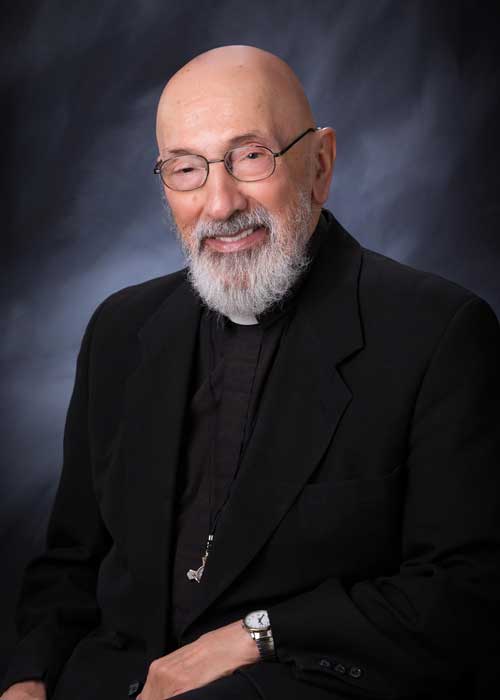The Nine Ways of Prayer of St. Dominic
Podcast: Play in new window | Download (Duration: 2:26 — 2.2MB) | Embed
Subscribe: Apple Podcasts | Spotify | Amazon Music | Android | Pandora | iHeartRadio | JioSaavn | Podchaser | Gaana | Podcast Index | Email | TuneIn | Deezer | Anghami | RSS | More
The Second Way of Prayer
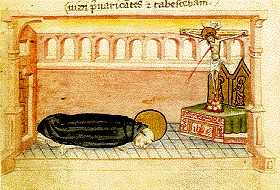 St. Dominic used to pray by throwing himself outstretched upon the ground, lying on his face. He would feel great remorse in his heart and call to mind those words of the Gospel, saying sometimes in a voice loud enough to be heard: “O God, be merciful to me, a sinner.” [Luke 18:13] With devotion and reverence he repeated that verse of David: “I am he that has sinned, I have done wickedly.” [II Kings 24:17]. Then he would weep and groan vehemently and say: “I am not worthy to see the heights of heaven because of the greatness of my iniquity, for I have aroused thy anger and done what is evil in thy sight”(28). From the psalm: “Deus auribus nostris audivimus” he said fervently and devoutly: “For our soul is cast down to the dust, our belly is flat on the earth!” [Ps. 43:25]. To this he would add: “My soul is prostrate in the dust; quicken thou me according to thy word” [Ps. 118:25].
St. Dominic used to pray by throwing himself outstretched upon the ground, lying on his face. He would feel great remorse in his heart and call to mind those words of the Gospel, saying sometimes in a voice loud enough to be heard: “O God, be merciful to me, a sinner.” [Luke 18:13] With devotion and reverence he repeated that verse of David: “I am he that has sinned, I have done wickedly.” [II Kings 24:17]. Then he would weep and groan vehemently and say: “I am not worthy to see the heights of heaven because of the greatness of my iniquity, for I have aroused thy anger and done what is evil in thy sight”(28). From the psalm: “Deus auribus nostris audivimus” he said fervently and devoutly: “For our soul is cast down to the dust, our belly is flat on the earth!” [Ps. 43:25]. To this he would add: “My soul is prostrate in the dust; quicken thou me according to thy word” [Ps. 118:25].
Wishing to teach the brethren to pray reverently, he would sometimes say to them: When those devout Magi entered the dwelling they found the child with Mary, his mother, and falling down they worshipped him. There is no doubt that we too have found the God-Man with Mary, his handmaid. “Come, let us adore and fall down in prostration before God, and let us weep before God, and let us weep before the Lord that made us” [Ps. 94:61. He would also exhort the young men, and say to them: If you cannot weep for your own sins because you have none, remember that there are many sinners who can be disposed for mercy and charity. It was for these that the prophets lamented; and when Jesus saw them, he wept bitterly. The holy David also wept as he said: “I beheld the transgressors and began to grieve” [Ps. 118:158].

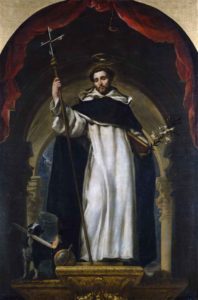 For the complete list visit:
For the complete list visit: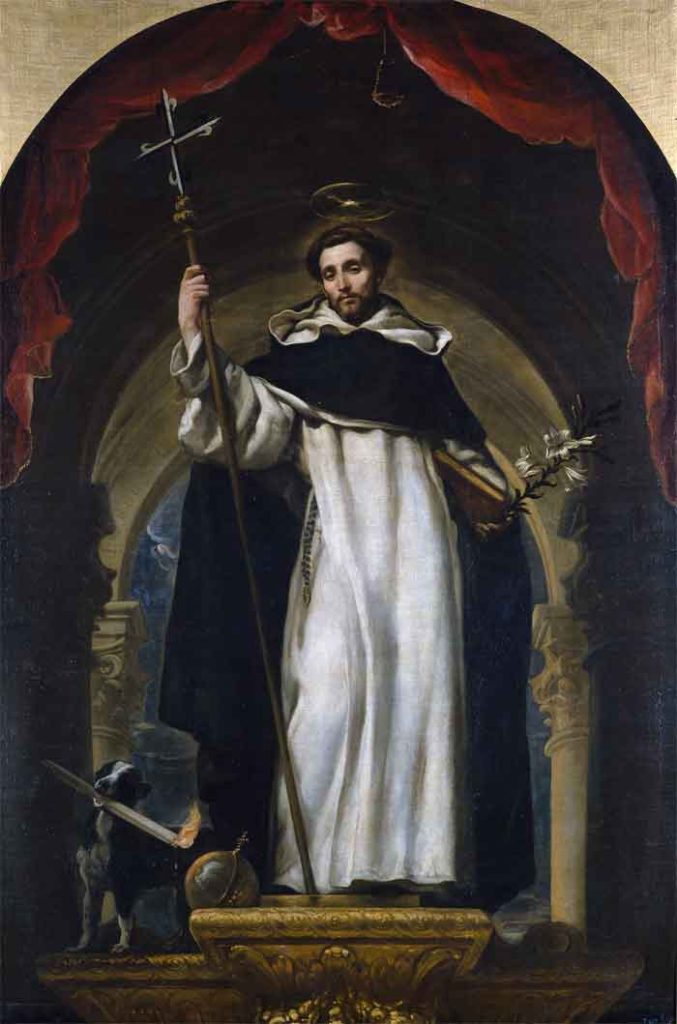 Holy teachers like Augustine, Ambrose, Gregory, Hilary, Isidore, John Chrysostom, John Damascene, Bernard, and other saintly Greek and Latin doctors have discoursed on prayer at great length. They have encouraged and described it, pointed out its necessity and value, explained the method, the dispositions which are required, and the impediments which stand in its way. In learned books, the glorious and venerable doctor, Brother Thomas Aquinas, and Albert, of the Order of Preachers, as well as William in his treatise on the virtues, have considered admirably and in a holy, devout, and beautiful manner that form of prayer in which the soul makes use of the members of the body to raise itself more devoutly to God. In this way the soul, in moving the body, is moved by it. At times it becomes rapt in ecstasy as was Saint Paul, or is caught up in a rapture of the spirit like the prophet David. Saint Dominic often prayed in this way, and it is fitting that we say something of his method.
Holy teachers like Augustine, Ambrose, Gregory, Hilary, Isidore, John Chrysostom, John Damascene, Bernard, and other saintly Greek and Latin doctors have discoursed on prayer at great length. They have encouraged and described it, pointed out its necessity and value, explained the method, the dispositions which are required, and the impediments which stand in its way. In learned books, the glorious and venerable doctor, Brother Thomas Aquinas, and Albert, of the Order of Preachers, as well as William in his treatise on the virtues, have considered admirably and in a holy, devout, and beautiful manner that form of prayer in which the soul makes use of the members of the body to raise itself more devoutly to God. In this way the soul, in moving the body, is moved by it. At times it becomes rapt in ecstasy as was Saint Paul, or is caught up in a rapture of the spirit like the prophet David. Saint Dominic often prayed in this way, and it is fitting that we say something of his method.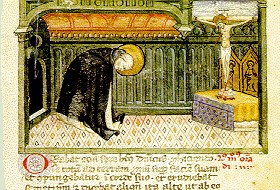 Saint Dominic’s first way of prayer was to humble himself before the altar as if Christ, signified by the altar, were truly and personally present and not in symbol alone. He would say with Judith: “O Lord, God, the prayer of the humble and the meek hath always pleased Thee [Judith 9:16]. “It was through humility that the Canaanite woman and the prodigal son obtained what they desired; as for me, “I am not worthy that Thou shouldst come under my roof” [Matt. 8:8] for “I have been humbled before you exceedingly, O Lord [Ps. 118:107].:
Saint Dominic’s first way of prayer was to humble himself before the altar as if Christ, signified by the altar, were truly and personally present and not in symbol alone. He would say with Judith: “O Lord, God, the prayer of the humble and the meek hath always pleased Thee [Judith 9:16]. “It was through humility that the Canaanite woman and the prodigal son obtained what they desired; as for me, “I am not worthy that Thou shouldst come under my roof” [Matt. 8:8] for “I have been humbled before you exceedingly, O Lord [Ps. 118:107].: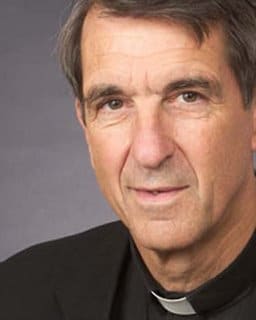 Adrienne von Speyr (1902 – 1967) was a Swiss medical doctor, convert to Catholicism, a mystic, wife and author of over 60 books on spirituality and theology. She collaborated closely with Hans Urs Von Balthasar, her confessor for 27 years, and together co-founded the Community of Saint John. Her numerous writings, published by Ignatius Press, are being recognized by leading theologians as a major contribution to the mystical and spiritual writings of the Church.
Adrienne von Speyr (1902 – 1967) was a Swiss medical doctor, convert to Catholicism, a mystic, wife and author of over 60 books on spirituality and theology. She collaborated closely with Hans Urs Von Balthasar, her confessor for 27 years, and together co-founded the Community of Saint John. Her numerous writings, published by Ignatius Press, are being recognized by leading theologians as a major contribution to the mystical and spiritual writings of the Church.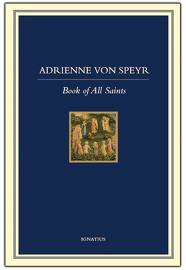
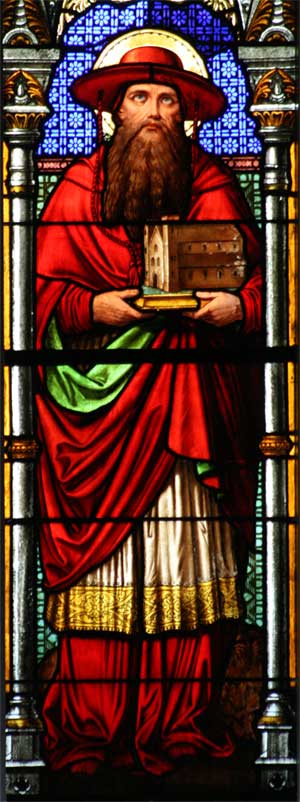
 Heart of Hope Part 5 — The purpose of life, the suffering of humanity and how it relates to the grace of God. Emotional Suffering, Purgation, Christ’s sacrifice on the Cross, and Redemption
Heart of Hope Part 5 — The purpose of life, the suffering of humanity and how it relates to the grace of God. Emotional Suffering, Purgation, Christ’s sacrifice on the Cross, and Redemption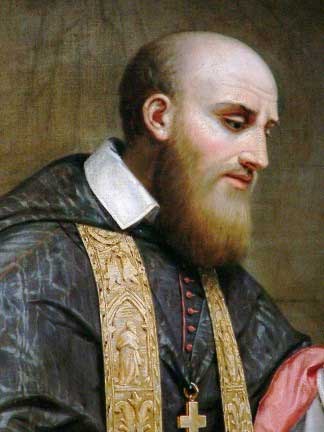 Introduction to the Devout Life
Introduction to the Devout Life
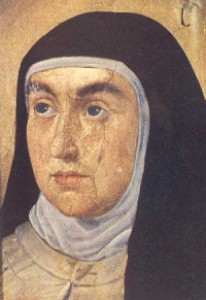
 Today we celebrate not only the feast of St. Anthony of Padua but also the 89th birthday of Msgr. Esseff, who takes the time to reflect on his special relationship with this great saint.
Today we celebrate not only the feast of St. Anthony of Padua but also the 89th birthday of Msgr. Esseff, who takes the time to reflect on his special relationship with this great saint.